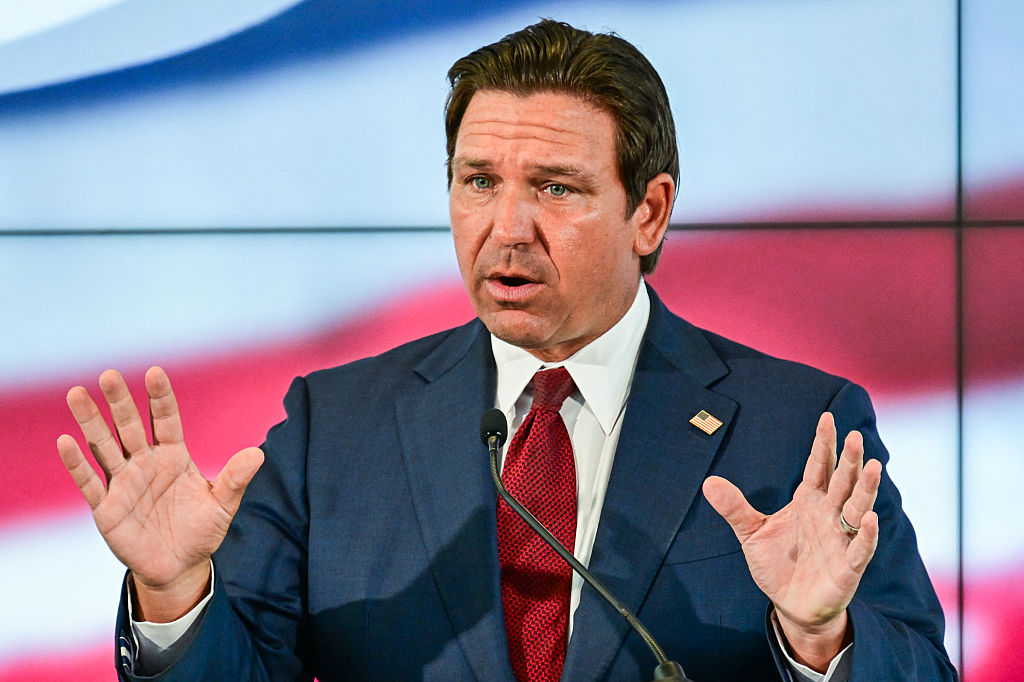Copyright International Business Times

TAMPA, Florida — Florida Governor Ron DeSantis escalated the national debate over immigration and workforce policy Wednesday by directing state universities to cease hiring foreign workers under the H-1B specialty occupation visa program, a move that could reshape higher education staffing across one of America's largest public university systems. Speaking at the University of South Florida, DeSantis characterized the federal visa program as fundamentally flawed, arguing that Florida's public universities should prioritize American graduates for employment opportunities rather than recruiting international talent. "Universities across the country are importing foreign workers on H-1B visas instead of hiring Americans who are qualified and available to do the job," DeSantis declared. "We will not tolerate H-1B abuse in Florida institutions. That's why I have directed the Florida Board of Governors to end this practice." The directive targets a workforce of nearly 400 foreign nationals currently employed at Florida's public universities under H-1B status, according to data from U.S. Citizenship and Immigration Services. The visa program, designed to allow U.S. employers to temporarily employ foreign workers in specialty occupations requiring theoretical or technical expertise, has become increasingly controversial in recent months. THE SCOPE OF H-1B IN FLORIDA HIGHER EDUCATION According to the most recent USCIS data through June 30, 2025, Florida hosts more than 1,900 employers sponsoring over 7,200 H-1B visa holders statewide. Within the education sector specifically, 78 employers support 677 beneficiaries across the state. The University of Florida leads all institutions with 156 H-1B visa holders, followed by the University of Miami at 90, and the University of South Florida at 72. These three institutions also operate the state's largest medical programs, an important factor given that thousands of H-1B visas nationwide are utilized by foreign physicians, though the technology sector remains the program's largest user. During his announcement, DeSantis highlighted specific positions he deemed inappropriate for the visa program, questioning why roles such as assistant athletic coaches and media relations specialists required foreign workers. He cited examples including a power systems researcher from Wuhan, China, and a clinical assistant professor from the West Bank, suggesting these positions represented "social justice" hiring rather than legitimate specialty occupation needs. "I don't understand how is that specialized knowledge that only someone from these places can do," DeSantis said. "A 40,000 dollar a year job working as the assistant at the athletic department? That's an abuse of this whole idea." ALIGNMENT WITH TRUMP ADMINISTRATION PRIORITIES DeSantis's directive arrives one month after President Donald Trump announced a dramatic restructuring of the H-1B visa program, implementing a 100,000 dollar fee for future applications. The fee, typically paid by employers, represents a nearly 500-fold increase from the previous 215 dollar charge and applies to petitions filed after September 21, 2025. Trump's proclamation accompanying the fee increase cited "systematic abuse" of the program, though the measure does not impact visa holders already working in the United States. The administration's move is expected to face legal challenges from business groups and educational institutions that rely on the program. The H-1B visa controversy has exposed divisions even within Trump's political coalition. Technology entrepreneur Elon Musk, who has taken a prominent advisory role in the administration, strongly supports the visa program, arguing it enables American companies to access global talent. Conversely, immigration restrictionists like DeSantis contend the program displaces American workers with cheaper foreign labor. DeSantis elaborated on this perspective during his remarks, stating: "Tech companies will fire Americans and hire H-1B at a discount, and they're basically indentured servants ... They're indentured to the company, so the company can basically pay them low." The governor's reference alludes to the fact that the vast majority of H-1B visas are issued to workers from India and China, with Indians receiving approximately 283,397 visas in 2024 compared to 46,680 for Chinese nationals, according to federal data. UNIVERSITY LEADERS RESPOND Dr. Donald Landry, interim president of the University of Florida, appeared alongside DeSantis at the press conference and endorsed a review of H-1B visa usage at his institution. Landry acknowledged concerns about the program while defending its selective use in academia. "We know that H-1B is not handled in a pristine fashion, even in academia, certainly not in business," Landry said. He noted that the university uses the visa program to attract exceptional international students who may subsequently be recruited to faculty positions: "Occasionally, some bright light might be good enough for the faculty, then we will try and retain the person into whom we've invested so much." The State University System of Florida, through its director of public affairs Marnie Marrero, issued a statement supporting the governor's position: The system "supports Governor DeSantis' and the federal government's efforts to strengthen and modernize the H-1B visa program, protecting opportunities for American graduates and ending the improper use of H-1B visas." However, faculty representatives expressed strong opposition to the directive. Robert Cassanello, president of the United Faculty of Florida and a University of Central Florida history professor, criticized what he characterized as inconsistency in DeSantis's education policies. Cassanello noted the irony of the governor's simultaneous emphasis on merit-based hiring at universities and his opposition to a program designed to recruit highly qualified specialists. "It's not that universities don't want to hire American applicants for positions, but rather that many times there aren't enough qualified applicants, especially for science and math positions," Cassanello explained. "And many times, the best applicants come from other countries." THE STEM EDUCATION PIPELINE CHALLENGE The debate highlights a persistent challenge in American higher education and workforce development: the shortage of domestic students pursuing advanced degrees in science, technology, engineering and mathematics fields. According to the National Center for Science and Engineering Statistics, approximately 60 percent of individuals who earned Ph.D. degrees in computer science from U.S. universities in 2023 were temporary visa holders rather than American citizens or permanent residents. Similar patterns exist across multiple STEM disciplines. University staff working under H-1B visas are largely concentrated in computer science, engineering, physics and chemistry departments, according to faculty representatives. These fields face chronic shortages of qualified American candidates at the graduate and post-doctoral levels. DeSantis challenged this narrative, questioning why Florida's universities cannot produce sufficient graduates to fill these positions. "Why aren't we producing math and engineering folks who can do this?" the governor asked. "If any universities are truly struggling to find U.S. citizens to fill their job openings, they ought to evaluate their academic programs to determine why they cannot produce graduates who can be hired for these positions." LEGAL AND PRACTICAL IMPLICATIONS The practical implementation of DeSantis's directive faces several complications. H-1B visas are issued for an initial three-year period with the possibility of a three-year extension, meaning current visa holders could remain legally employed for up to six years from their initial approval date. Universities are exempt from federal H-1B caps, allowing them to hire foreign workers year-round without competing in the annual lottery system that private sector employers must navigate. This exemption has made higher education institutions significant users of the program. Ending Florida state universities' participation in H-1B hiring could affect hundreds of workers currently legally present in the United States with visas tied to their institutional employers. These individuals face difficult choices: they could seek alternative employment with H-1B sponsorship from private companies, potentially relocate to other states, pursue permanent residency through marriage to a U.S. citizen, or return to their countries of origin. Some H-1B holders pursue permanent residency through the PERM labor certification process, in which their employer advocates for their green card application by demonstrating that the individual uniquely qualifies for their position and that no qualified American workers are available. FLORIDA DOGE CONNECTION DeSantis's announcement included a broader context of fiscal oversight in Florida higher education. The governor revealed that "Florida DOGE" — a state-level efficiency initiative inspired by the federal Department of Government Efficiency led by Elon Musk — has partnered with federal authorities and university systems to cancel or repurpose millions of dollars in diversity, equity and inclusion-related grants. This connection underscores how DeSantis has positioned Florida as a testing ground for policies later adopted or considered at the federal level. The state previously led on immigration enforcement measures that were subsequently reflected in Trump administration policies, including mass deportation efforts and increased Immigration and Customs Enforcement presence. NATIONAL IMPLICATIONS While Florida is not among the largest states for H-1B utilization — California, New York, Texas and New Jersey far exceed its numbers — DeSantis's move could influence policy discussions in other Republican-governed states. The Department of Justice has already requested public reports of potentially discriminatory visa practices that harm American workers. Assistant Attorney General for Civil Rights Harmeet Dhillon urged citizens in late August to report job advertisements that inappropriately preference foreign workers on seasonal or H-1B visas. "Are you an American citizen who has been harmed by inappropriate preferences for foreign workers, e.g. H1-B or other? Follow the link..." Dhillon posted on social media. "It's also a place to report human trafficking of immigrant workers, and Title VII employment discrimination." The convergence of state and federal action on H-1B visas signals a significant shift in American immigration policy, extending beyond traditional concerns about illegal immigration to encompass legal pathways for high-skilled workers. THE BROADER DEBATE The controversy reflects deeper tensions in American policy regarding global competitiveness, workforce development and immigration. Supporters of robust H-1B programs argue that access to international talent strengthens American institutions and prevents the migration of cutting-edge research and development to other countries. Critics contend that the program has been corrupted from its original intent, enabling employers to bypass American workers in favor of foreign employees who may accept lower salaries and face limited job mobility due to their visa status. Universities occupy a complex position in this debate. While they are employers of H-1B workers, they are also educational institutions responsible for training the next generation of American scientists, engineers and researchers. The criticism that universities simultaneously educate foreign graduate students while employing foreign faculty highlights questions about the effectiveness of efforts to encourage American students into STEM careers. As DeSantis's directive moves toward implementation through the Florida Board of Governors, its effects will be closely watched by policymakers, educators and immigration reform advocates across the country. The outcome could determine whether other states follow Florida's model or whether legal challenges and practical obstacles prevent the policy from being fully realized. For now, hundreds of foreign workers at Florida universities face uncertain futures, while American students and job seekers await evidence that the policy will translate into meaningful employment opportunities in highly specialized academic fields.



